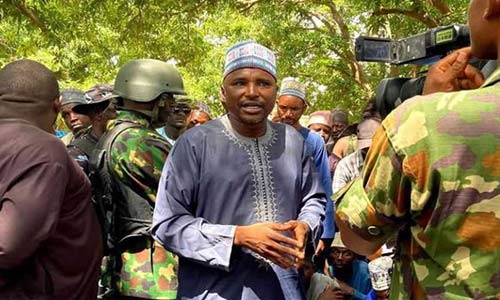 In a bold but controversial move to restore peace in Katsina State, several notorious terrorist commanders operating in Dan Musa Local Government Area have surrendered their arms and freed 16 hostages under a state-backed amnesty and disengagement programme.
In a bold but controversial move to restore peace in Katsina State, several notorious terrorist commanders operating in Dan Musa Local Government Area have surrendered their arms and freed 16 hostages under a state-backed amnesty and disengagement programme.
The Nigerian Army, in a statement released on Saturday, June 14, 2025, revealed that the mass surrender came through Operation Fagge Fasan Yamma, supported by local stakeholders. Among those who turned themselves in were hardened bandit lords — Kamulu Buzaru, Manore, Nagwaggo, Lalbi, Alhaji Sani, Dogo Baidu, Dogo Nahalle, and Abdulkadir Black.
The Army confirmed that all weapons — including AK-47s, a G3 rifle, a pump-action shotgun, a PKT machine gun, and magazines — were safely secured. “They’ve pledged to renounce violence and live in peace,” the military noted.
As part of the deal, 16 hostages — seven women and nine children, including a pregnant woman — were freed. The group promised to release all remaining captives by Sunday, June 15.
In a widely circulated video, ex-bandit-turned-peacemaker Adamu Alero spoke in Hausa, urging the repentant fighters — many of whom he once commanded — to turn away from violence for good. He appealed to society to support the former fighters’ families, especially through education and rehabilitation.
But the fragile peace process quickly ignited public fury when Ado Aleru, a notorious warlord with a ₦5 million bounty on his head, appeared openly at a reconciliation meeting in Bichi community, also in Dan Musa LGA. Wanted since 2020, Aleru was seen addressing local chiefs, security officials, and clerics — with soldiers and government reps present — as though he were a dignitary, not a fugitive.
Aleru reportedly proposed terms for ending the bloodshed and claimed he and seven other commanders had also surrendered. 17 more hostages were released as a goodwill gesture.
The spectacle drew outrage across Katsina and beyond. A senior state official told ThisDay:
“Ado Aleru was declared wanted. He’s now public and free — this is not peace, it’s betrayal. He should be arrested, not appeased.”
But Katsina State Commissioner for Security and Home Affairs, Nasir Mua’zu, defended the government’s approach. Speaking to BBC Hausa, he acknowledged the backlash but insisted the peace effort was genuine.
“For two years, we fought them. The governor will not negotiate with terrorists — but anyone who sincerely lays down arms is welcome,” he said.
He cited Islamic teachings and the Geneva Convention, insisting it would be unlawful to attack those who voluntarily seek peace.
As tensions simmer, the fate of Katsina’s amnesty experiment — balancing justice and reintegration — remains on a knife’s edge. While some hail it as a path to lasting peace, others warn it could embolden impunity and deepen public distrust in the justice system.